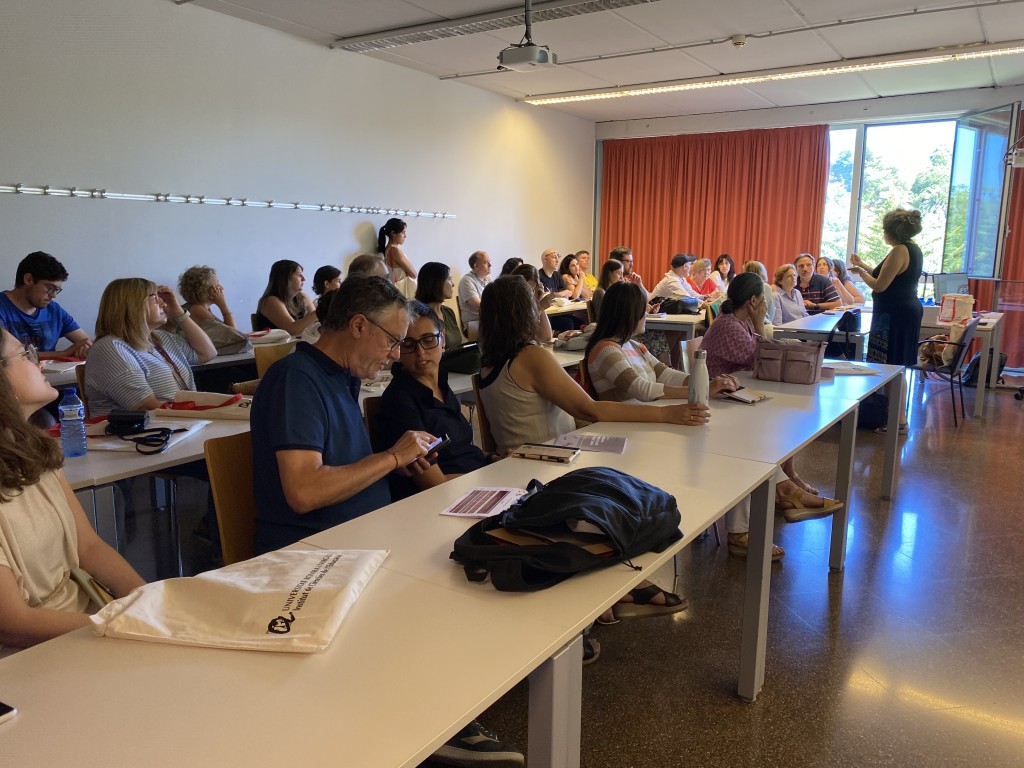05/07/2024
URV teaching staff join forces to tackle two major teaching challenges: interdisciplinarity and the use of AI in the classroom
More than 150 participants exchange best practices and learn about the first results of the two strategic networks at the URV's 2024 Teaching Innovation Seminar

More than 150 participants exchange best practices and learn about the first results of the two strategic networks at the URV's 2024 Teaching Innovation Seminar
The introduction of the new artificial intelligence techniques in teaching and the interdisciplinary training of students so that they learn to solve real and complex problems are two of the greatest challenges currently facing the field of education. For this reason, the URV’s Institute of Education Sciences (ICE) has promoted two strategic networks in which teachers and technical staff collaborate to create resources that make it possible to implement and systematise both the use of AI and interdisciplinary teaching in the classroom.
Toni Pérez Portabella, director of the ICE, explained during the URV’s 2024 Teaching Innovation Seminar that these networks have been set up during the current academic year 2023-24 to jointly propose solutions to challenges and integrate them into the University’s teaching practices and policies.
The aim of the Teaching Innovation Seminar, which took place on 2 July at the URV’s Catalunya Campus, was to share knowledge and enrich teaching at the university and during other educational stages. For this reason, teaching staff from the URV and other educational centres shared the 32 teaching innovation projects they have carried out during the last academic year. The projects cover various fields, including simulation and learning environments, professional development, digital resources, assessment strategies and multilingual competence, among others. Of these, 25 were responses to the ICE’s calls for teaching innovation and seven were projects that received bridging grants from the ICE and the URV’s Social Council, whereby university teachers and teachers from other educational stages participate together.

Artificial intelligence in everyday life
“In the same way that it now seems unthinkable to work and teach without the Internet, artificial intelligence will end up being incorporated into everyday life”, explained Roser Cuesta, lecturer in the Department of Nursing and member of the network of methodological innovations, during the Teaching Innovation Seminar. It is on this basis that the network coordinated by Daniel Schorn and Jokin Ezenarro, professors of the Department of Analytical Chemistry and Organic Chemistry, will offer teaching staff various guides and resources to help them implement AI techniques during the coming academic year. This is the case of a prompting guide (showing how to interact with and give instructions to AI tools), which was explained to the conference by Jaume Capdevila, technician and expert from the Department of Analytical and Organic Chemistry.
The different teams that the network has been organised into are considering the ethical implications of the new methodologies, which tools can be used and how to use them, among other issues.
This will provide a response to what has already been detected in an initial survey of teachers: “The risks that most of them perceive are ethical questions and a lack of preparation”, explained Luis Marqués, professor at the Department of Pedagogy and member of the network, during the presentation. On the other hand, teachers see two clear benefits in the use of AI: increased efficiency in teaching tasks and the creation of educational content.
Professionals trained in an interdisciplinary approach to social challenges
M. Dolores Jiménez, head of the Department of Romance Languages, and Judith Balanyà, lecturer in the Department of Pedagogy and technician in the Educational Resources Service, coordinate the interdisciplinary network in the field of teaching. Jiménez explains that the challenge is to “convince future professionals, who are today’s students, of the need to take various approaches to tackling society’s greatest challenges “. Hence the importance of training students in the integration of different disciplines when developing solutions.
To do this Jiménez and Balanyà are developing a didactic guide for teachers and, for next year, a pilot project to be carried out with various teachers and students who are to produce interdisciplinary final year theses. Thus, two or more students from different degree programmes will be required to work together on a thesis that is intended to tackle a real social challenge, therefore contributing knowledge from each discipline in order to generate an integrated result. The experience gained during the coming academic year will be evaluated and transformed into a methodological guide.
Judith Balanyà explains that this way of teaching and learning “makes the experience more meaningful for students and, moreover, reflects the reality of the workplace, where work teams are made up of people with different professional profiles”.
In addition to the pilot project, this network will make available to teachers and students a catalogue of thesis topics and is collecting information to draw up an interdisciplinarity map and detect the areas that are already working in this manner as well as those that are not through a survey for teachers that promotes actions to encourage connections between disciplines or areas of knowledge.
Another survey is also underway for detecting initiatives that integrate artificial intelligence as a tool to support learning.
